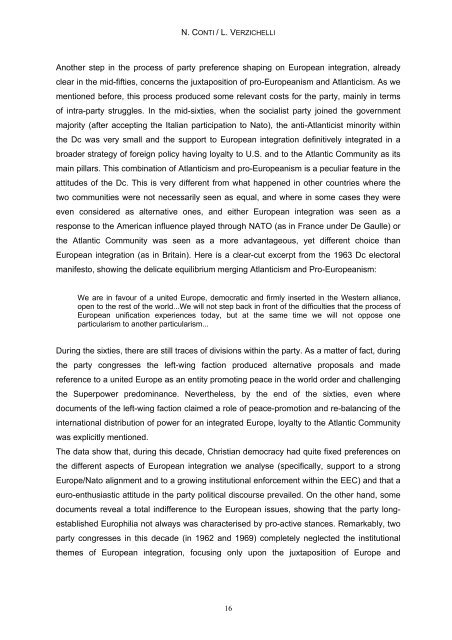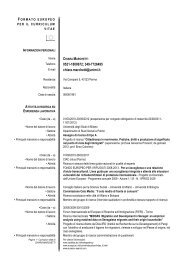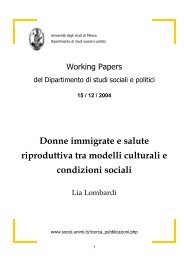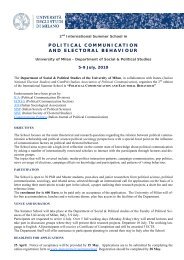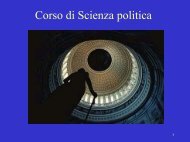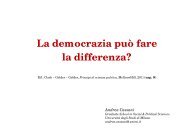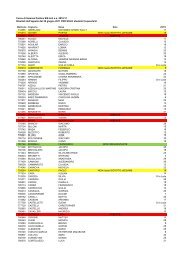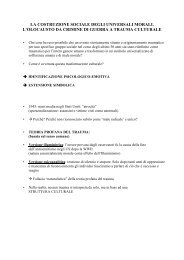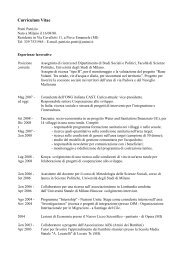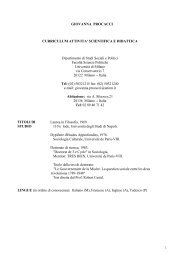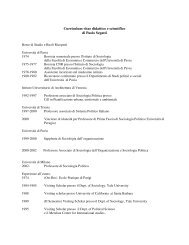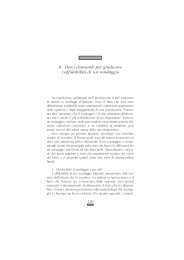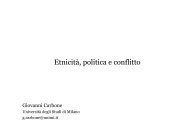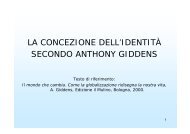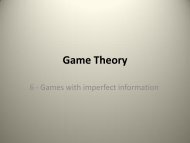The european dimension of political discourse in Italy. A ... - CIRCaP
The european dimension of political discourse in Italy. A ... - CIRCaP
The european dimension of political discourse in Italy. A ... - CIRCaP
You also want an ePaper? Increase the reach of your titles
YUMPU automatically turns print PDFs into web optimized ePapers that Google loves.
N. CONTI / L. VERZICHELLI<br />
Another step <strong>in</strong> the process <strong>of</strong> party preference shap<strong>in</strong>g on European <strong>in</strong>tegration, already<br />
clear <strong>in</strong> the mid-fifties, concerns the juxtaposition <strong>of</strong> pro-Europeanism and Atlanticism. As we<br />
mentioned before, this process produced some relevant costs for the party, ma<strong>in</strong>ly <strong>in</strong> terms<br />
<strong>of</strong> <strong>in</strong>tra-party struggles. In the mid-sixties, when the socialist party jo<strong>in</strong>ed the government<br />
majority (after accept<strong>in</strong>g the Italian participation to Nato), the anti-Atlanticist m<strong>in</strong>ority with<strong>in</strong><br />
the Dc was very small and the support to European <strong>in</strong>tegration def<strong>in</strong>itively <strong>in</strong>tegrated <strong>in</strong> a<br />
broader strategy <strong>of</strong> foreign policy hav<strong>in</strong>g loyalty to U.S. and to the Atlantic Community as its<br />
ma<strong>in</strong> pillars. This comb<strong>in</strong>ation <strong>of</strong> Atlanticism and pro-Europeanism is a peculiar feature <strong>in</strong> the<br />
attitudes <strong>of</strong> the Dc. This is very different from what happened <strong>in</strong> other countries where the<br />
two communities were not necessarily seen as equal, and where <strong>in</strong> some cases they were<br />
even considered as alternative ones, and either European <strong>in</strong>tegration was seen as a<br />
response to the American <strong>in</strong>fluence played through NATO (as <strong>in</strong> France under De Gaulle) or<br />
the Atlantic Community was seen as a more advantageous, yet different choice than<br />
European <strong>in</strong>tegration (as <strong>in</strong> Brita<strong>in</strong>). Here is a clear-cut excerpt from the 1963 Dc electoral<br />
manifesto, show<strong>in</strong>g the delicate equilibrium merg<strong>in</strong>g Atlanticism and Pro-Europeanism:<br />
We are <strong>in</strong> favour <strong>of</strong> a united Europe, democratic and firmly <strong>in</strong>serted <strong>in</strong> the Western alliance,<br />
open to the rest <strong>of</strong> the world...We will not step back <strong>in</strong> front <strong>of</strong> the difficulties that the process <strong>of</strong><br />
European unification experiences today, but at the same time we will not oppose one<br />
particularism to another particularism...<br />
Dur<strong>in</strong>g the sixties, there are still traces <strong>of</strong> divisions with<strong>in</strong> the party. As a matter <strong>of</strong> fact, dur<strong>in</strong>g<br />
the party congresses the left-w<strong>in</strong>g faction produced alternative proposals and made<br />
reference to a united Europe as an entity promot<strong>in</strong>g peace <strong>in</strong> the world order and challeng<strong>in</strong>g<br />
the Superpower predom<strong>in</strong>ance. Nevertheless, by the end <strong>of</strong> the sixties, even where<br />
documents <strong>of</strong> the left-w<strong>in</strong>g faction claimed a role <strong>of</strong> peace-promotion and re-balanc<strong>in</strong>g <strong>of</strong> the<br />
<strong>in</strong>ternational distribution <strong>of</strong> power for an <strong>in</strong>tegrated Europe, loyalty to the Atlantic Community<br />
was explicitly mentioned.<br />
<strong>The</strong> data show that, dur<strong>in</strong>g this decade, Christian democracy had quite fixed preferences on<br />
the different aspects <strong>of</strong> European <strong>in</strong>tegration we analyse (specifically, support to a strong<br />
Europe/Nato alignment and to a grow<strong>in</strong>g <strong>in</strong>stitutional enforcement with<strong>in</strong> the EEC) and that a<br />
euro-enthusiastic attitude <strong>in</strong> the party <strong>political</strong> <strong>discourse</strong> prevailed. On the other hand, some<br />
documents reveal a total <strong>in</strong>difference to the European issues, show<strong>in</strong>g that the party longestablished<br />
Europhilia not always was characterised by pro-active stances. Remarkably, two<br />
party congresses <strong>in</strong> this decade (<strong>in</strong> 1962 and 1969) completely neglected the <strong>in</strong>stitutional<br />
themes <strong>of</strong> European <strong>in</strong>tegration, focus<strong>in</strong>g only upon the juxtaposition <strong>of</strong> Europe and<br />
16


